|
Ofaloaf posted:Hell yeah it is. The Indies are rich and full of exotic goods, so why not take over the biggest island of them all? Surely being the largest, it must be the richest and most fertile. The Pretty Borders faction approves
|
|
|
|

|
| # ? May 11, 2024 13:15 |
|
Well, having independence is good, but I fear there may be consequences of leaving our old dynasty behind.
|
|
|
|
Ofaloaf posted:Hell yeah it is. The Indies are rich and full of exotic goods, so why not take over the biggest island of them all? Surely being the largest, it must be the richest and most fertile. Papua New Gothiola
|
|
|
|
Did Mauretania never set up colonies?
|
|
|
|
Luhood posted:You say that, but I think it's actually Tarnate. You know, that weird Pacific state that always colonize everything in the near Pacific by the start of the 1700s. Oh by all means, I was just hoping that somehow there was an exiled Croatian Pacific islander state in existence
|
|
|
|
Are we going to consider reforms so that something like this never happens again?
Crowsbeak fucked around with this message at 20:12 on Nov 3, 2017 |
|
|
|
Mr_Autoshades posted:Did Mauretania never set up colonies? Crowsbeak posted:Are we going to consider reforms so that something like this never happens again?
|
|
|
|
Is that Lusitania in Chile? I wonder who's going to colonize the West Coast of North America. I figured we'd get around to it eventually, but Portuguese California/Cascadian sounds awesome too.
|
|
|
|
Who's that eating up Australia?
|
|
|
|
EDIT: Nevermind
Grouchio fucked around with this message at 19:29 on Nov 8, 2017 |
|
|
|
Ofaloaf posted:Pfft, we'll be fine. This was truly exceptional- monarchies are always a stable form of government. My word! It's as if they all want us to let the commoners have some sort of say in how things are done. Ridiculous.
|
|
|
|
wiegieman posted:My word! It's as if they all want us to let the commoners have some sort of say in how things are done. Ridiculous. Nah it's fine, absolutism is the one and only true way we need to get the  train straight on track, no detours down the long and twisty path of liberalism train straight on track, no detours down the long and twisty path of liberalism
|
|
|
|
This is posted with OP approval (and not mine)quote:REMOVE KÖTTBULLAR remove köttbullar
|
|
|
|
what are some meatball recipes from this alternate history? has hamburgar been discovered? thank you.
|
|
|
|
Fututor Magnus posted:what are some meatball recipes from this alternate history? The Ostrogoths would've been settling in With the advent of the Age of Exploration and the European discovery of the East Indies, the early modern spice trade could've given new twists to Gothic meatballs. A well-off merchant with money to spare for spices from the Indies might've ended up getting something like Quebecois ragoût de boulettes, drowning meatballs in a gravy of cinnamon and cloves and nutmeg. For something less decadent, I'd suspect that cloves and pepper would've just been added directly, creating a meatball with an incredibly sharp and spicy flavor. quote:has hamburgar been discovered?
|
|
|
|
Ofaloaf posted:Roughly around the time that Total War Attila takes place, a Roman possibly named Apicius wrote De Re Conquinaria- "On The Subject Of Cooking". The closest thing in it to a meatball is probably recipe № 261, Offellae Ostienses. That recipe calls for meat to be scraped "as thin as skin" and then "shaped", mixed with a load of spices, pickled, and then roasted. Interestingly, the recipe calls for silphium, which is a now-extinct plant that might've been used as a contraceptive in Antiquity.
|
|
|
|
Ofaloaf posted:*snip* 
|
|
|
|
Chapter 60: Novus Ordo Gothorum 1653-1673 After Gothia broke free from its personal union under Romania, the new King of Gothia, Pèitre IV de Margens, strove to rebuild the country's military and economic strength while also reinvigorating old political institutions. Starting off with the still-smoldering realm of 1653, Pèitre IV spent the next twenty years rebuilding and reinforcing the country.  Gothia had fought a three-year-long war against Romania, which had previously ruled over Gothia after its king had won the Gothic crown in a succession crisis. Although Romania was allied to Thrace (and Thrace had its own union with the enormous realm of Sorbia), Gothic rebels managed to overcome the odds against them by currying favor with new friends such as the expanding realm of Mauretania and the westerized Pequot realm in North America. With allies on all sides, the Goths were able to force the Romanian-Thracian alliance to commit troops to several fronts and render it unable to bear local numerical superiority in the Gothic theater. After three years of bloody fighting, the Romanians conceded defeat, and one of the rebel leaders, Pèitre de Margens, was crowned the new king of Gothia.  Fortunately for Gothia, the realm was in good hands with the new king's court. King Pèitre IV himself was an exceptionally skilled man, adept as both a bureaucrat and a diplomat and known for his careful personality. Although he had nary a military bone in his body (and indeed never led a regiment himself during the war against Romania), he knew enough in other realms to delegate such matters to other men in the kingdom. His daughter, a precocious baby, was already showing a knack for impressing people around her, and seemed likely to go on to be an able diplomat later in life. Pèitre's young wife showed little of the diplomatic skill of her husband or her daughter, but could match any of them in administrative ability. The king also employed the very best men he could find in the realm and entrusted them with great responsibilities. Although Gothia itself was still recovering economically from the war, the realm's colonies were still sending gold ships across the Atlantic with little trouble, and it was this colonial revenue that helped keep the Gothic government funded and afloat in the 1650s. 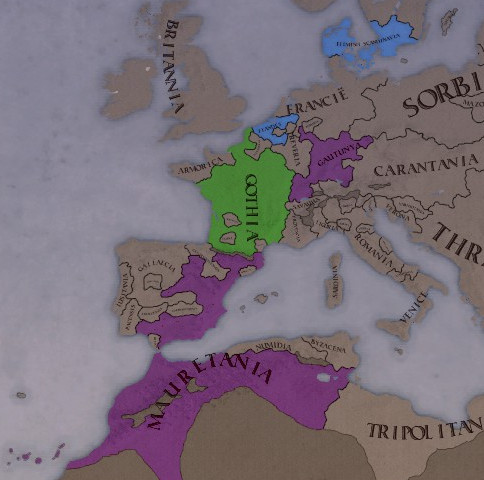 One of the first priorities for the new government was rebuilding Gothia's diplomatic standing in Europe and a web of alliances to support it. The realm had emerged from its war for independence with alliances to the Pequots and Flandès. The Pequot realm was powerful in North America, but offered little chance for help in Europe. Flandès had only allied with Gothia to spite Romania, and with peace was likely to end its alliance with the Goths at any time. Pèitre IV had also already arranged for some royal marriages, securing relations with Mauretania to the south and Gautunya to the east. While the king meant to capitalize on these relations, he also sought to secure a surprising alliance with another power.  By some contemporary accounts, the Franks in northern Germany were as surprised as anyone else by Pèitre IV's overture to them, but they happily accepted. King Pèitre's goal was to create an “insulation” for Gothia- an alliance with Mauretania would protect Gothia's southern border from any troubles in Hispania, and an alliance with Gautunya would help at least run some interference in the Alps and the Upper Rhineland, hopefully also disrupting any attempts by Romania to re-invade Gothia. An alliance with Frankië, to Gothia's northeast, would in turn act as “insulation” against any attacks from Sorbia or one of the (dwindling number of) Rhenish realms.  By the end of the first year of his reign, Pèitre's three key alliances were in place- along with the Franks, the Mauretanians had happily accepted the offer of an alliance the moment the idea was first floated. Gautunya had taken a little more time to convince, but a few months of lobbying by Gothic envoys did its work and so the Gothonians joined the alliance in October of 1653.  Although Gothia's continental borders were now well-protected, the threat of the British still loomed large. British colonies dominated South America, and British ships roved the Atlantic at will. The Channel separating Britannia and Gothia was patrolled by far more British ships than Gothic ones. If Britannia ever went to war against Gothia, access to the colonies would be cut off and the Goths would essentially be trapped in the metropole.  Pèitre IV's solution was to find new places for ports (and new places for trade) far away from the British, where more money and more ships could be raised without the threat of a British fleet lurking nearby. Colonies further east, in New Guinea, were already showing some minor promise as trade ports in the East Indies.  With such grand schemes, however, King Pèitre needed to curry support at home. He was new to the crown and from a new dynasty; his legitimacy as king was still somewhat shaky. With that concern in mind, a large part of Pèitre IV's reign was dedicated to flattering the Gothic Senate and bolstering his own family's legitimacy through popular support.  Overseas, Pèitre IV took the opposite tack to curry favor with the recently-rebellious Gothic colonies in the New World- he simply maintained a hands-off policy towards them, granting them a tremendous amount of autonomy and generally just leaving them be. The general product of that attitude was more colonial wars against the natives and more expansion into the interior, which bolstered tariff revenues from the colonies and suited the Gothic court just fine.  With alliances secured with several neighboring powers, the colonies mollified and clear objectives for domestic and foreign policy, the Gothic court began to pursue several specific schemes. Foremost among them was a new war against Treveria; the failure of the Triarian dynasty in Romania to reward Gothia with any territory from that Rhenish realm had been one of the causes of Gothia's war of independence, and the new Gothic government expected that a victorious rematch there would do much to cement its rule and win support domestically.  The first preparations for this Treverian venture appeared late in 1656, when a pamphlet succinctly titled The True Origin of the Gothic People and Lands, Concerning the Conquests of the Amalingian Dynasty and Their Imperial Legitimacy was published anonymously, asserting that Gothia's “correct” border was the Rhine River, not only as a “natural” border but as the border of Roman Gaul, which, so the pamphlet asserted, the Goths had received the legal right to rule the entirety of by the Romans in the 5th century, an assertion which may have consciously echoed the medieval forgery known as the Bounty of Honorius. Virdunensis, the pamphlet claimed, had long been cherished by the Romans as the “beating heart of Gaul”- a patent falsehood- and yet was not part of the Gothic realm which had the legal right to rule it. The True Origin was a sensation in Gothia, and soon members of the Senate could be found beseeching the crown to pursue action and “restore rightful rule to all corners of the realm's true domains”. Pèitre privately encouraged such talk, but as of yet publicly refrained from taking any action. 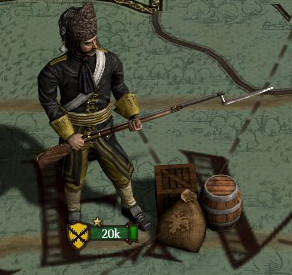 The second major sign of preparations came on January 18th, 1658, when the government passed into law an act notionally concerning the regulation of army uniforms. 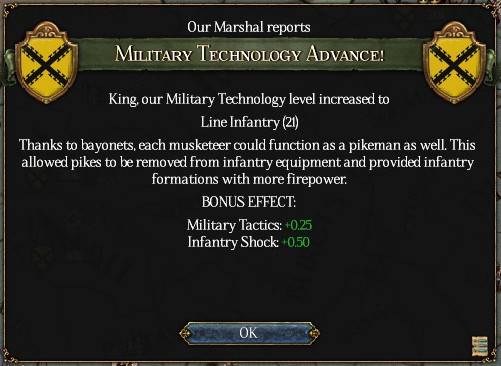 Uniforms did change, with grenadiers being granted bearskin hats as standard-issue wear and all state soldiers issued black jackets with golden cuffs and epaulets. However, the real change was almost mentioned as a mere aside in the new regulations. Bayonets and bayonet use were to be standardized, issued to all infantry, with pike units either gradually being retired or retrained as musket-bearing line infantry.  The final part the plan fell into place in February of 1659. Duke Bartholomeus VI of Treveria ruled the realm on paper, but the duke had been crowned when he was a toddler, and since then the administration of the realm had in practice fallen to a string of regents, most notably the skilled diplomat Beatrice de Dipo. Regent Beatrice, however, had been deposed in a palace intrigue in March of 1658, and for the next year a clique of courtiers collectively (and ineptly) ruled the duchy as a regency council. In February of 1659, however, a nobleman who had been excluded from the council revolted in Nancí. Rioting and brigandage soon spread, and provinces all along the Gothic-Treverian border were plagued by unrest. 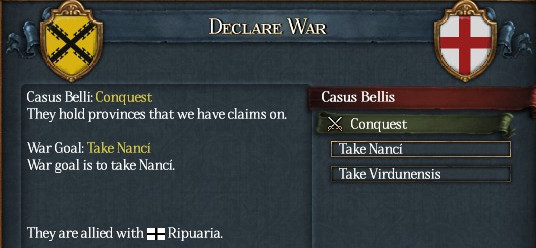 Echoing arguments from The True Origin and the Bounty of Honorius, on May 12th of 1659 Pèitre IV announced that he was sending troops into Nancí to restore order, “as is my right as sovereign”. The Treverian government refused to accept this proclamation, and so the Gothic-Treverian War began.  Palace intrigues had taken their toll on the Treverian military, and most of the army was stationed in the capital, supporting one coup one moment and another intrigue the next. Gothic troops thus met no significant resistance in their initial offensive, the only challenge being the one small rebel Treverian army from the February insurrection.  This state of affairs did not last for long. Eventually the Treverian regency council appointed Deusdedit de Belgica, an officer who had managed to steer clear of all the palace intrigues, to lead the defense of Treverian territory. As Nancí, Virdunensis and Caturiges were already occupied or besieged by the Goths, General Belgica was ordered to attack one of the Gothic armies immediately and drive them out. The Treverian general hesitated, but committed to an attack once Treveria's sole ally in the war, Ripuaria, sent a detachment led by Alberich Oppasunus to reinforce the duchy's meager army.  The battle was close, but ultimately the Goths had managed to just barely outnumber and outmaneuver Treveria's forces. After additional Gothic reinforcements had begun to swing the tide of battle in the Goths' favor, General Belgica reportedly fled the battlefield, leaving General Oppasunus and the Ripuarians to bear the brunt of blame for the defeat.  Just over a month later, on October 8th, 1660, Nancí's besieged garrison, sensing there would be no second force sent to relieve them, surrendered to the Goths.  With the fall of Treveria's southernmost fortified town, Gothia's armies began a sweeping maneuver from the south up into the central and eastern parts of the duchy, with the western Gothic army, still besieging Virdunensis, acting as a pivot. Treverian forces remained clear of advancing Gothic armies until the Goths approached the ducal capital, at which point General Belgica, once again given command of an army by the Treverian government, hurried to save the city.  Just as Belgica's men arrived at the siegeworks surrounding the capital, Virdunensis finally surrendered to the Goths, freeing the western Gothic army to rush eastward and reinforce the troops that faced Belgica's onslaught.  With the timely arrival of those reinforcements, the Goths were able to defeat Belgica's forces, but even so they took only a few thousand less losses than Belgica's much smaller army. The Goths' advantage could have been pressed further, but with General Belgica's second defeat Pèitre IV pushed for negotiations and an end to hostilities.  Peace was signed with Treveria on January 8th, 1661. Pèitre IV got everything he wanted out of the settlement- the fortified provinces of Nancí and Virdunensis were ceded to Gothia, Treveria was compelled to pay large reparations, and, most importantly for King Pèitre, he had managed to succeed where the Triarian kings had failed to deliver.  Pèitre had walked a fine line with his settlement. The Gothonian court, nominally in control of the imperial Roman government, was deeply disturbed by Gothia's annexations and expansion within the empire- but not quite enough for them to end their alliance with the Goths or join any coalition against them. With this implicit (but frustrated) approval, Gothia's newest acquisitions were essentially secured.  With the war concluded, Pèitre IV's government began scaling back many financial measures that had been used to fund the military in the leadup to the conflict. Tariffs, a longstanding sore spot between Gothia and its colonies, were reduced across the board.  Conscription was also scaled back after the war. The sieges which characterized a predominant portion of the Gothic side of the conflict had been incredibly deadly affairs, with both assaults and diseases killing thousands of Gothic soldiers. In the face of a public backlash after war's end, Pèitre publicly vowed to never commit so many soldiers to such deadly actions again.  Even as Pèitre promised an end to bloodshed, his court began drawing up plans for another war. Gothic colonization of New Guinea had been continuing apace throughout the war of independence and early part of Pèitre IV's reign, and now the entirety of the island was in Gothic hands. Its lush forests could potentially serve as a new source for ship-building timber, but the king was already beginning to have grander thoughts about the region. The colonization of New Guinea had brought Gothia into contact with Majapahit in the East Indies, and Pèitre now began dreaming of turning the whole of the Indies into a vast trade empire for the Goths.  Obfuscating his expansionist ideas, Pèitre IV brought Riculf Goscemps, a humanist philospher, into the government. Goscemps had been involved in several municipal projects in the capital concerning paupers and poor relief, and the king brought him to court in the hopes that Goscemps could pursue projects that simultaneously would boost the realm's diplomatic standing and perhaps help the realm recruit more soldiers.  Goscemps certainly went to work with a reforming zeal. The philosopher implemented a series of social reforms in the recently-conquered Treverian provinces, hurrying from Nancí to the capital for consultations in the palace before rushing back to Nancí to announce another scheme for reform and relief.  Unfortunately for the cause of reform, it soon became clear that Riculf Goscemps was abusing his new position of power. Just two days after Christmas in 1666, the philosopher was caught in flagrante with Pèitre IV's wife, Queen Victoria. The king, furious but collected, fired Goscemps, paid him off, and ordered separate chambers to be prepared for his wife. Without the energetic philosopher around, the projects for poor relief in Nancí soon fell to the wayside, and the promise of reform withered away.  Seeking to distract the public from this disappointing trends in domestic policy (and perhaps to distract himself personally), the king became more explicit about his yearning for a war in the East Indies. The timing for it was right- Majapahit was engulfed in a terrible war against the Kingdom of Khmer, and had already lost men and money in a futile attempt to defend the Malay Peninsula. In the winter of 1666/7, Gothia's New World army stationed at the mouth of the Mississippi was reassigned to the far side of the world, and arrived nearly a year later at a just-founded Gothic colony on Lingga, off the coast of Sumatra. On December 1st, 1667, Gothic troops left Lingga and landed in Majapahit territory, starting the Gothic-Majapahit War.  Innovations from Europe had only slowly trickled into the East Indies, usually by land through the Middle East, India and Southeast Asia. Majapahit's soldiers were equipped with muskets, but lacked bayonets or any of the line infantry innovations of the past quarter-century that the Gothic army employed. Even though Gothic troops were outnumbered in many of the battles of the war, their better musketry and organization helped them win far more battles than would have otherwise been the case.  Majapahit's Sumatran forts still proved a significant obstacle, however. Even though Majapahit's armies were beaten repeatedly on the field, Gothic armies were penned in by a truly staggering number of forts peppering the island. Despite winning battle after battle, the Goths were struggling to win the war.  The climate of Sumatra was also taking its toll on the Goths. Between the siege actions, bloody battles, and vicious natural conditions of the island, the Gothic army was slowly worn down until it could no longer win in the field like it once was able to. 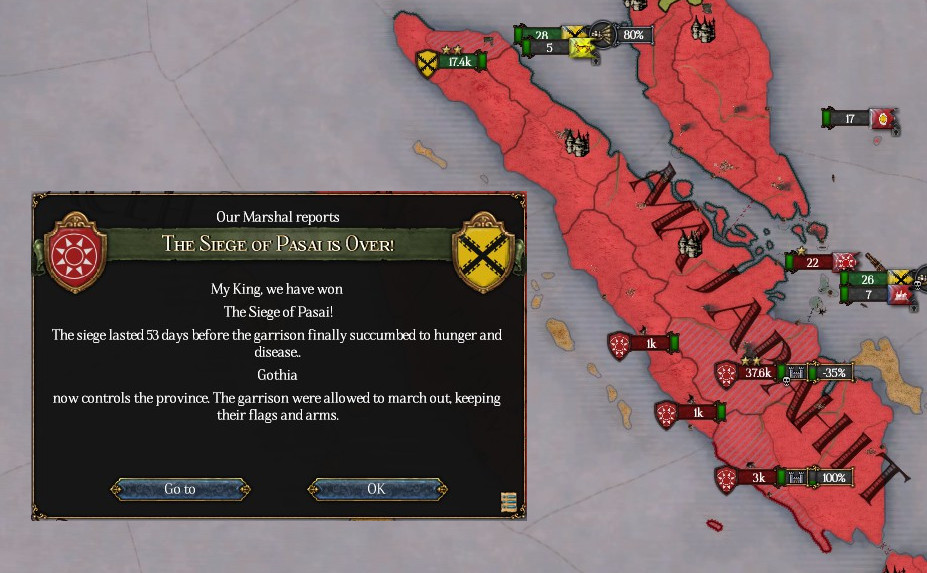 The Goths decided to change tactics, using Sumatra's forts against Majapahit and utilizing the navy which Pèitre had begun to expand. Withdrawing to the ships, the Goths baited Majapahit's army into investing some of the same forts that the Goths had spent years besieging and then garrisoned. Gambling that these forts would tie down Majapahit's forces long enough, the navy then transported the Gothic army to the northern tip of Sumatra, far away from previous battles, and there the Goths were able to capture Pasai and much of the surrounding territory while Majapahit saw no success in retaking the southern Sumatran forts.  Finally, on April 3rd, 1671, Majapahit came to terms with Gothia, surrendering the entirety of Aceh to the Goths.  To simplify the administration of the far-flung territory, Pèitre IV announced that he would grant the territories to a newly-founded East India Company (Gautés: Companhiá deis Índias Orientalas; CIO), save one port which would remain under the control of the crown and serve as a military base.  To the King's chagrin, not everybody cheered for his government's victory in the East Indies. Some critics denounced the loss of Gothic lives, while others pointed out that the kingdom's fixation on the Orient had actually let an Oriental country establish a foothold in the New World almost right on the border of Gothia's own American colonies.  Aware that his war against Majapahit had somewhat violated the spirit of his post-Treverian vow to not let Gothic blood be wastefully spilled, the king sought to again shore up his support in the Senate. This time, he approached the senators with a plan to permanently limit his own prerogatives as sovereign and  To help the senators settle on a single idea to embrace out of the many possibilities, the king sent his three closest advisers to the Senate to argue for three specific courses.
Pèitre IV, noting that two of his advisers shared unfortunately similar names, requested that senators casting a vote show the portrait of the adviser they support when casting a vote, to simply the process of counting. He wished them all good tidings, and finally added that the senate had 24 hours to cast a vote before voting in this session would be closed. The world, 1673: 
|
|
|
|
Jeez, slow down on these updates. You're going to burn out.
Tiberius Thyben fucked around with this message at 03:30 on Jan 17, 2018 |
|
|
|
Tiberius Thyben posted:Jeez, slow down on these updates. You're going to burn out.
|
|
|
|
Can't believe the update of 2018 is already here!  Quantity Frionnel fucked around with this message at 05:36 on Jan 17, 2018 |
|
|
|
 You can't go wrong with more money.
|
|
|
|
 Influence
|
|
|
|
 Gothia requires soldiers. Our legions will take everything that we have been denied by capricious Fate, and build an Empire to last forever! And holy poo poo, is that Jerusalem in Egypt?
|
|
|
|
 Quantity. We need to Mr.Morgenstern fucked around with this message at 04:51 on Jan 17, 2018 |
|
|
|
 Influence, let's finally annex the rest of Gaul! (also update the ck2 gothmod for jade dragon pretty please)
|
|
|
|
Gothia should continue expanding, all the way to the river some call the Rhine. And maybe take measures to ensure the electors of the Empire act wisely. Influence  . .
|
|
|
|
Let's get fancy Influence  . .
|
|
|
|
 Quantity
|
|
|
|
 Quantity. Only by
|
|
|
|
Goth armies seem to suffer a LOT of casualties. Quantity
|
|
|
|
 TRADE DOSH. The modern Rome rests on global, growing trade, from the Americas to the Far East. The more we aid this the stronger we become.
|
|
|
|
 Quantity
|
|
|
|
 Trade! Trade!Maybe gold doesn't rule this world, but it can't hurt to have more of it.
|
|
|
|
I want more of Europe, I want the Empire.
|
|
|
|
 Trade! Trade!
|
|
|
 Trade Trade
|
|
|
|
|
 Trade TradeI would also very strongly argue for Offensive ideas over Quantity. If we end up fighting nations that have properly stacked military bonuses, we are running the risk of getting our armies wiped.
|
|
|
|
 [b]Trade[/b [b]Trade[/b
|
|
|
|

|
| # ? May 11, 2024 13:15 |
|
 Trade! Trade!
|
|
|















































